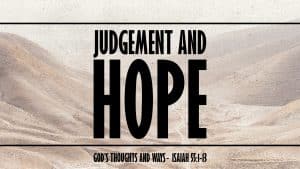Genesis 2:15-17 and Revelation 20:12-15
The Lord God took the man and put him in the Garden of Eden to work it and take care of it. And the Lord God commanded the man, “You are free to eat from any tree in the garden; but you must not eat from the tree of the knowledge of good and evil, for when you eat from it you will certainly die.” (Gen 2:15-17)
And I saw the dead, great and small, standing before the throne, and books were opened. Another book was opened, which is the book of life. The dead were judged according to what they had done as recorded in the books…Anyone whose name was not found written in the book of life was thrown into the lake of fire. (Rev 20:12-15)
In Luke 18 Jesus tells the story of a Pharisee boasting, “God, I thank you that I am not like other people — robbers, evildoers, adulterers — or even like this tax collector.” The tax collector stood head-bowed at the back of the temple and said, “God, have mercy on me, a sinner.” Jesus then said, “I tell you that this man, rather than the other, went home justified before God. For all those who exalt themselves will be humbled, and those who humble themselves will be exalted.”
In 2014 the Australian Film John Doe: Vigilante was released. Like the hit series “Arrow”, it follows familiar vigilante themes. The main character “John Doe” (Jamie Bamber) is a hoodie-wearing vigilante avenger. He executes his victims, believing that the police and courts aren’t doing their job to his satisfaction. He’s an anti-hero who takes the law into his own hands, crossing a boundary that none should cross.
In Genesis chapter 2, the Tree of the Knowledge of Good and Evil represents God’s role as the ultimate and true standard of what is good (and by contrast what’s evil) in the universe. So God is the final Judge of all, the highest court. In forbidding Adam to eat from this tree God is warning Adam away from the deadly path of the vigilante, of setting his own standards of good and evil apart from God, and trying to usurp God as the judge of all. Sadly, humanity (in Adam) took the path of the vigilante. He ate from the tree. The costs of setting our own standards of good and evil apart from God, often in ‘religious’ forms like the Pharisee, are seen across our world every day. Praise God that his mercy and forgiveness in the cross of Jesus are more powerful and provide the way for ‘vigilante’ men and women to come back to God. This is what the book of life in Revelation 20 is a picture of, those who like the tax collector say, “God, have mercy on me, a sinner.”
Head: Is God, as revealed finally by Jesus in the New Testament, the ultimate and true standard of what is good (and by contrast what’s evil) in my life?
Heart: Do I see myself as a forgiven ‘vigilante’ who relies on God’s mercy in Jesus?
Hands: How will this change the way I speak and act today?
Prayer: Heavenly Father, I thank you that in Jesus you have revealed fully and finally your ultimate and true standard of what is good (and by contrast what’s evil). I admit I’m a part of Adam’s human family that, in him, took the ‘vigilante’ path of setting our own standards of good and evil apart from you. I praise you for your mercy and forgiveness in Jesus, pictured so graphically in Revelation’s metaphor “the book of life”, which is powerful and provides the way for us ‘vigilante’ men and women to come back to you. Please enable me to stop thinking and acting as the effective master of good and evil in my life, and instead to live as a real, forgiven follower of Jesus. In Jesus’ name I pray. Amen.
A song to listen to: This is Amazing Grace
Phil Strong

